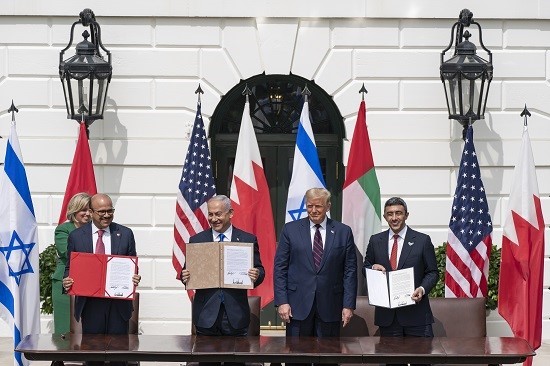There is a concerted campaign in the US Congress
to increase support for the Abraham Accords, signed on September 15, 2020. Both
the House of Representatives and the Senate created two caucuses in order to
leverage these accords.
اضافة اعلان
 (Photo: Flickr)
(Photo: Flickr)
The House’s caucus came out at the initiative of the
Republican representative from the second district of Missouri, Ann Wagner.
However, the caucus is chaired by representative Cathy McMorris Rodgers (R-WA),
David Trone (D-MD), Ann Wagner (R-Mo) and Brad Schneider (D-IL).
On the other hand, the Senate’s caucus is chaired by
senators James Lankford (R-OK), Jackie Rosen (D-NV) Joni Ernst (R-IA) and Cory
Booker (D-NJ).
The rationale for creating such caucuses, as Ann Wagner said
in a press release published by her office on January 10, 2022, is: “The
Abraham Accords caucus is an incredibly important initiative that will bolster
the US commitment to peace in the Middle East. This caucus will
build on the achievements of the Abraham Accords and promote stability in the
region, counteract destructive regimes, and help maintain robust working
relationship between our Israeli and Arab partners.”
Lawrence J. Hass, a well-known author and a member of the
American Foreign Policy Council, published an article on January 18, 2022,
titled “Why Joe Biden should leverage the Abraham Accords to bring stability to
the Middle East?” To him, President Biden should look closely at the advantages
of those accords and mount a campaign to widen its membership.
To Hass, “the question is whether, in the months to come,
the Biden Administration will view the accords as an opportunity to promote
American’s regional interests or as a distraction from its other challenges”.
In a way, Hass is calling on the president not the squander
the opportunity of expanding subscription to the accords, which will help the
American position in a vital region of the world.
To further stress his thesis, Hass purports that a united
Arab-Israeli front can neutralize Iran’s nuclear ambitions and alienate Iran
from the region. Yet, when it comes to the Palestinian issue, he sticks to the
unidimensional approach of economics. The more aid and robust the Palestinian
economy, the more alienated Hamas would be in Gaza, the belief goes.
If the Abraham Accords caucus builds up the momentum in the
US Congress, and if the Republicans win back the majority in both Houses in the
mid-term elections in November, the Abraham Accords will gain greater momentum.
What are the options for Jordan? Well, Jordan can choose to
stay the course and take a vigilant position vis-à-vis the accords, while
working to ensure the basic Palestinian rights, and help Jordan benefit
economically as well, or join the bandwagon of the accords. The second option
could be the wisest course of action.
Divisions among the Palestinian leadership in both Gaza and
the occupied West Bank, and between the two factions of the Islamic movement in
Israel are allowing the current Israeli government to continue with its
flagrant abuses of the rights of the Palestinians. In addition, these
differences are stifling the ability of Arab countries like Jordan to leverage
their respective support for the Palestinians.
Jordan is suffering economically and all reports indicate
the delicacy and the serious trade-offs Jordan must make to boost its economic
prospects.
What decision will Jordan take in the near future?
Jawad Anani is an economist, and has held several
ministerial posts, including former deputy prime minister and former chief of
the Royal Court.
Read more Opinion and Analysis









